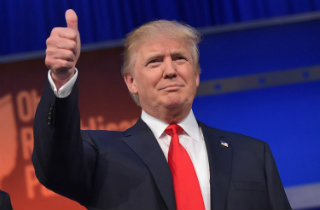
The U.S. Constitution does require the President to take the oath of office. Article II, Section I, Clause 8 says:
Before he enter on the Execution of his Office, he shall take the following Oath or Affirmation: — “I do solemnly swear (or affirm) that I will faithfully execute the Office of President of the United States, and will to the best of my Ability, preserve, protect and defend the Constitution of the United States.”
However, note that nowhere does the Constitution say that the Chief Justice must administer the oath of office.
“I think the main point is that the oath doesn’t need to be administered by the Chief Justice. After Kennedy’s assassination, a federal district judge in Texas administered the oath to Johnson,” Ned Foley, an election law professor at the Moritz School of Law at Ohio State Unitversity told LawNewz.com. In other words, let’s say in the very off chance Roberts agrees to these demands, it is certain Trump would find a friendly judge to administer the oath instead.
“Any judge or even another authority could do so,” Norman Ornstein, with the American Enterprise Institute told LawNewz.com.
In addition, the 20th Amendment to the U.S. Constitution states that “the terms of the President and the Vice President shall end at noon on the 20th day of January.” So there are other legal experts that argue that President-elect Trump would become President Trump automatically at noon on January 20th regardless if he has taken the Oath of Office yet or not. However, under this theory, he would still need to take the oath of office to execute any powers of the presidency at a later time. Let’s just say it all gets complicated.
Bottom line: much like the other efforts, there is little reason to believe that this latest push will result in anything other than Trump becoming President. Chief Justice Roberts, who was appointed by President George W. Bush, and is thought to be quite conservative, has given no indication that he will concede to any of these demands.
[image via wikipedia commons]